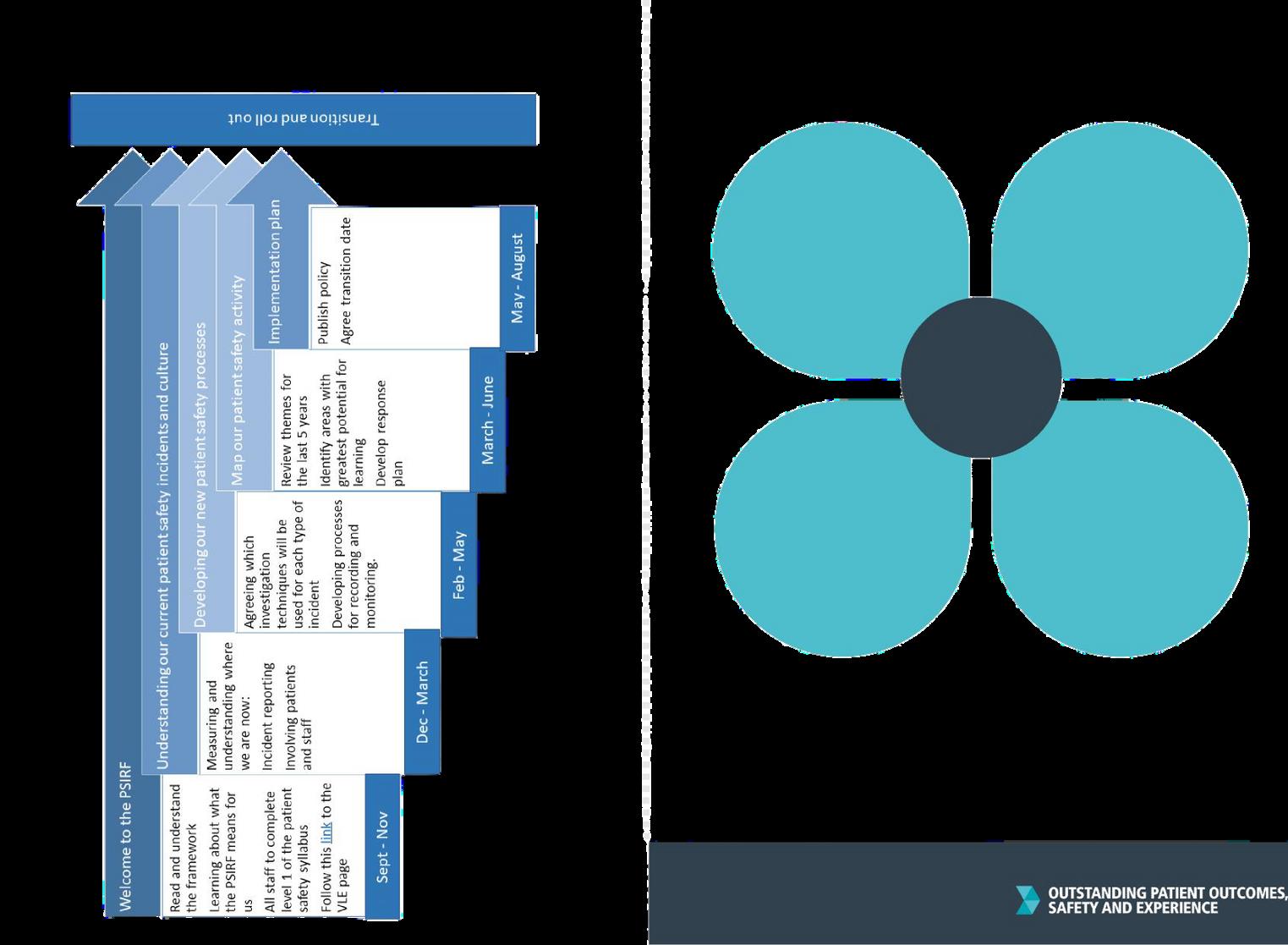
3 minute read
Patient Safety Incident Response Framework
Key contacts
Suzanne Van Hoek
Advertisement
Deputy Director Of Nursing for Quality Assurance & Safety
Email: Suzanne.vanhoek@southernhealth.nhs.uk
Liz Hall
Head of Patient Safety and Patient Safety Specialist
Email: Liz.hall@southernhealth.nhs.uk
Georgia Walker
Quality and Patient Safety Project Manager
Email: georgia.walker@southernhealth.nhs.uk
Beth Ford
Patient Safety Partner Lead
Email: Beth.ford@southernhealth.nhs.uk
Patient Safety Team
Email: Patientsafetyteam@southernhealth.nhs.uk
What is PSIRF
The Patient Safety Incident Response Framework (PSIRF) was published in August 2022, outlining how providers should respond to patient safety incidents for the purpose of learning and improvement
NHS England has published the new Patient Safety Incident Response Framework (PSIRF) outlining how NHS organisations should respond to patient safety incidents for the purpose of learning and improvement. The framework will replace the current Serious Incident Response
Framework by Autumn 2023, and represents a significant shift in the way the NHS responds to patient safety incidents, centring on compassion and involving those affected; system based approaches to learning and improvement; considered and proportionate responses; and supportive oversight.
PSIRF is a major step towards improving safety management across the healthcare system in England and will greatly support the NHS to embed the key principles of a patient safety culture. It will ensure the NHS focuses on understanding how incidents happen, rather than apportioning blame on individuals; allowing for more effective learning and improvement, and ultimately making NHS care safer for patients.
PSIRF removes the requirement that all/only incidents meeting the criteria of a ‘serious incident’ are investigated, allowing for other incidents to be investigated and for learning response resource to focus on areas with the greatest potential for patient safety improvement
Patient Safety Partners
Email: Patientsafetypartners@southernhealth.nhs.uk
PSIRF – A framework for learning and improvement
The new Patient Safety Incident Response Framework is being rolled out over the next year.
PSIRF sets a new direction for how the NHS responds to patient safety incidents, focusing on effective learning & improvement, compassionate engagement and embedding a patient safety culture.
Just and learning culture behaviours
A just and learning culture underpins the PSIRF It recognises that we a work in a highly complex environment where things do not always go to plan.

It allows us to learn using a compassionate approach that assumes good intention and understands the impact of the system and why decisions made sense at the time. It allows staff to speak up and it asks “what happened and how do we learn?”
Continuing to learn and evolve over
future years
12 months preparationfrom September 2022
Focusing on the “what” and not the “who” enables us to draw out the good practice within incidents in order to learning from positive events as well as learning from when things go wrong.
Investigation approach
Quality is the priority, selection of incidents based on potential for new learning and complexity of the system
Systems based PSII
Timeframe
Flexible and set in consultation with the patient and/or family
What does it mean for me?
Greater focus on understanding the impact of systems and human factors in patient safety incidents
Understanding the ‘what’ not the ‘who’ in investigations to support a just and learning culture
Not all Serious events will lead to a Patient Safety Incident Investigation – we can use other tools such as after action reviews, clinical audit or Morbidity & Mortality meetings
Greater support and involvement for those involved in patient safety incidents

Investigator expertise, experience, time and authority:
Must be led by those trained in PSII with authority to act autonomously with dedicated time and resource
What do I need to do?
All staff will be asked to complete level 1 of the patient safety syllabus, follow this link to the VLE page (or search Patient Safety Syllabus on the VLE).
We ask all our UHS staff to understand and sign up to the behaviours that support a just and learning culture
Those involved in patient safety investigations will be offered training from the patient safety team
Improved experience for those affected:
Expectations are clearly set for informing, involving, and supporting those affected by patient safety incidents, particularly patients, families and staff
Aligned with ongoing research around improving patient and family involvement
More proportionate and effective response:
Changes blunt rules to determine what to learn from and what not to learn from
Resource planning based on thorough understanding of patient safety incident profiles and ongoing improvement activity.
Supports organisations to be more proportionate, sensitive and considered in their approach
Better range of methods for learning:
Better range of methods for learning:
Promotes a range of methods for responding to and learning from patient safety incidents
Moves away from RCA, which does not represent best practice
Timelines are more flexible and set in consultation with the patient and/or family
Quality of response and resulting improvement work is the priority
Strengthened governance and oversight: incident response system that integrates four key aims.
Regulators and bodies like ICSs will consider the strength and effectiveness of organisations’ incident response processes Makes leaders of organisations providing healthcare accountable for how their organisation responds and improves following patient safety incidents.

Application of a range of system-based approaches to learning from patient safety incidents
Compassionate engagement and involvement of those affected by patient safety incidents
Considered and proportionate responses to patient safety incidents
Supportive oversight focused on strengthening response system functioning and improvement
Do you have any ideas or questions jot them here
Engagement & involvement of those affected by PSI's
Do you have any ideas or questions jot them here
Considered & proportionate responses to PSI's


